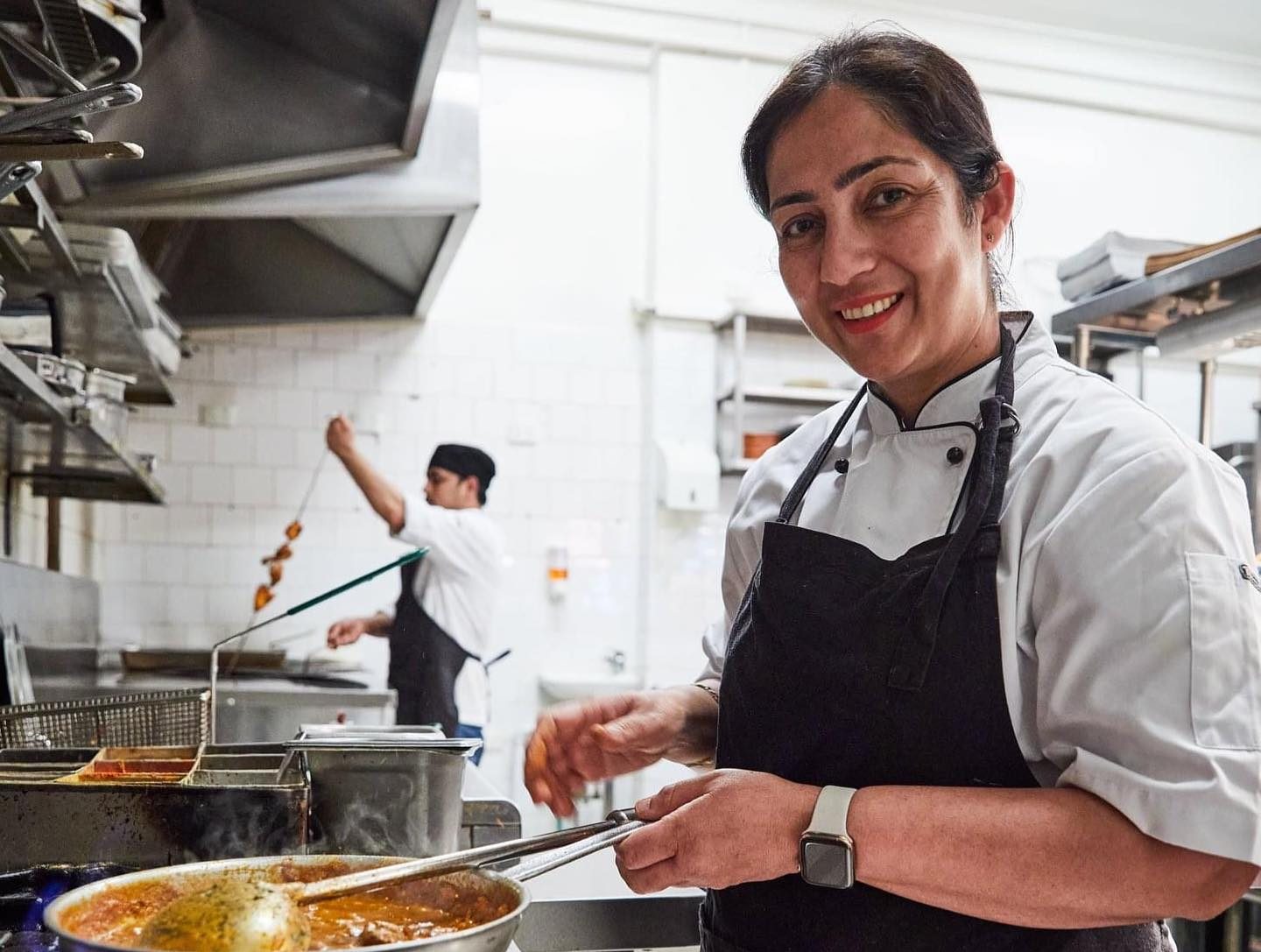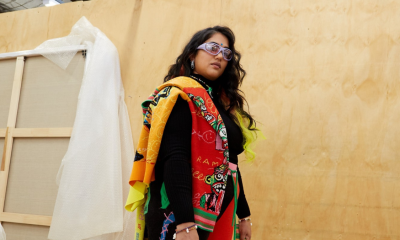People
Meet Melbourne’s Certified Curry Queen: Manpreet Sekhon Showcases Indian Flag-Inspired Flavours
In conversation with Manpreet Sekhon, the South Asian Australian chef behind Elchi, Masti, and Eastern Spice.

Do you daydream about somersaulting into a hot tub filled with trianga paneer? Does your mouth drool at the mere mention of lip-smacking lamb curry? Do you ever wish you could snorkel in a sea of spinach chicken tikka with coconut khichdi? Well, you can’t (or shouldn’t) do any of that because that would probably be a wee bit silly.
Not to worry, our Indian-food-obsessed amigos. Melbourne’s certified curry queen Manpreet Sekhon has you sorted. The South Asian Australian executive chef and three-time restaurateur—Eastern Spice, Masti, and Elchi—will be delivering dishes inspired by the colours of the Indian flag. The special menu will be available from 15 August 2023 until 20 August 2023 at Elchi in Melbourne/Naarm. (No Brown Boy Mag writers or editors were bribed with butter chicken to produce this article, promise.)
Ahead of the launch of the tricolour flag-inspired menu, we sat down with Manpreet to delve deeper into her culinary journey, her love of pani puri, and more.
Our conversation has been edited for clarity and concision.
Brown Boy Magazine: You’ve had an interesting journey—from migrating to Australia in 2005 to owning three successful restaurants today. Can you tell us a bit about your story? And can you talk about some of the unique challenges and opportunities you’ve faced in this entrepreneurial journey?
Manpreet Sekhon: My journey has been deeply fulfilling, and it all started with my early experiences in my mother’s kitchen in Punjab, India. Having worked alongside an array of talented chefs in my formative years, my unique approach to cooking won the praise of Jiggs Kalra, the “Czar of Indian Cuisine,” as well as Sanjeev Kapoor, a world-renowned Indian chef and entrepreneur.
In 2005, I moved to Australia with dreams of sharing the richness of Indian flavours with a broader audience. It was a bold step to venture into a new country with different cultural nuances and culinary preferences, but I was determined to pursue my vision. After arriving in Australia, I began my culinary journey by working in various restaurants, honing my skills, and learning from experienced chefs. Between 2014 and 2022, I opened my first restaurant, Eastern Spice, in Geelong, my second restaurant, Masti, in Fitzroy, and my third restaurant, Elchi, in the CBD.
As a female entrepreneur in a male-dominated industry, I encountered certain preconceptions and biases. Being a woman in the professional kitchen also meant that I had to work even harder to earn recognition and respect. However, I have always seen challenges as opportunities for growth. Embracing diversity, fostering an inclusive work culture, and encouraging my team to excel has been vital to our success.
A diverse team brings a wealth of ideas and creativity to the table, enhancing our culinary experiences and contributing to the overall success of my restaurants.
BB: You’ve passionately spoken about providing a deeper understanding of Indian cuisine and its cultural significance to Australian diners. You also mention that you’ve faced culinary ignorance, particularly around the expectations of Indian food in Australia. How have you navigated these misconceptions, and how have you tried to change people’s perspectives?
Manpreet Sekhon: When I first started in Australia, I noticed that Indian food was often stereotyped and limited to a few commonly known dishes. Many people expected Indian food to be overly spicy or heavy, not accurately representing India’s rich and diverse culinary traditions. I approached my restaurants with a vision to offer a more authentic and holistic representation of Indian cuisine. I wanted to showcase the regional diversity, complex flavours, and cultural significance of our dishes.
At my restaurants, we took the time to engage with our diners, sharing the stories and origins behind the dishes on our menu.
I believe in the importance of authenticity, which isn’t just about adhering to traditional recipes; it’s about respecting our dishes’ origins and cultural roots. It’s about preserving the flavours and techniques passed down through generations while allowing room for creative interpretations.
BB: Tell us more about your special menu. How does it reflect the rich flavours of India and the colours of the Indian flag? What do you want your diners to experience?
Manpreet Sekhon: Indian Independence Day holds a special place in our hearts, and we are thrilled to celebrate this significant occasion with a special menu showcasing India’s diverse and vibrant flavours. The special menu we have crafted for Indian Independence Day draws inspiration from the colours of the Indian flag – saffron, white, and green. These colours symbolise various aspects of our nation’s identity, and we have carefully curated dishes that represent these themes.
Saffron is a colour that evokes a sense of vibrancy and warmth. From tandoori delights to aromatic curries, saffron’s spirit is showcased in every dish. The colour white signifies purity and simplicity. In our menu, we incorporate dishes that embody the simplicity of traditional Indian cooking methods and highlight the use of fresh and wholesome ingredients. Green is a colour that reflects the lush landscapes of India. Our menu includes a variety of vegetarian dishes that celebrate the abundance of vegetables, lentils, and herbs in Indian cooking.
We want our diners to experience India’s culinary richness and cultural diversity through this special menu. Each dish has been carefully crafted to evoke nostalgia, trigger memories, and create a sense of togetherness as we celebrate the spirit of independence. We invite our guests to embark on a flavourful journey representing the tapestry of Indian culture, traditions, and celebrations.
BB: You’re a role model for many, especially female migrant entrepreneurs. Do you have any advice for other South Asian Australians aspiring to break into the restaurant or hospitality business?
Manpreet Sekhon: South Asian cuisine is rich, diverse, and filled with unique flavours.
Embrace your heritage and use it as a foundation to create an outstanding culinary identity. Showcase the authentic and traditional aspects of your culture while also infusing creativity and innovation into your dishes. As a South Asian Australian entrepreneur, your background and journey are part of your restaurant’s unique story. Share this story with your customers.
The restaurant industry can be challenging, and setbacks are a part of the journey. Stay resilient, adapt to changing circumstances, and continuously seek feedback to improve and grow. Finally, believe in your passion, talent, and abilities. Confidence in yourself and your vision will inspire others and help you overcome challenges along the way.
BB: We know that you’re an expert in the kitchen, but we’d love to know about your guilty food pleasure. Is there a dish or snack that you just can’t resist?
Manpreet Sekhon: It’s the classic Indian street food snack, Pani Puri. Pani Puri is a popular and flavourful street food that consists of small, hollow puris (crispy, round, and hollow dough balls) filled with a mixture of tangy and spicy water, tamarind chutney, boiled potatoes, chickpeas, and a medley of spices. It’s served in a way that encourages you to pop the whole puri into your mouth in one go. The combination of sweet, tangy, spicy, and savoury flavours, all wrapped in a crispy shell, is absolutely irresistible.
BB: If you were stranded on a desert island and could bring only one dish from your restaurant, what would it be and why?
Manpreet Sekhon: It would undoubtedly be the 24 Carat-Gold Chicken Mussalam from Elchi. This signature dish holds a special place in my heart. It beautifully blends traditional Indian flavours with a touch of luxury. The succulent and tender chicken is marinated in a medley of aromatic spices, resulting in a rich, flavourful, and incredibly satisfying dish. It is inspired by my upbringing in India, where dishes of great significance and grandeur often accompany festive meals. It evokes fond memories of celebrations and gatherings with loved ones.
Brown Boy Magazine (@brownboyau) celebrates worship-worthy tastemakers and changemakers in the South Asian Australian diaspora (without taking itself too seriously).







